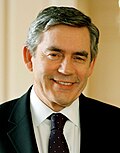Analysis
The economist Robert Barro had been asked by The Financial Times to explain the meaning of the term in an article, and had been subsequently mocked for using the term by the Chancellor of the Exchequer, Kenneth Clarke. [2] Barro subsequently said that "I suppose that I will never understand British humour". [2]
The Provost of Oriel College, Oxford, economist Derek Higgins, wrote a poem about Post neoclassical endogenous growth theory in the style of William McGonagall after The Guardian journalist Charlotte Higgns "floated the (im)possibility" of Brown writing such a piece. [3] Higgins wrote that Morris's poem " ... apart from being a lot of fun, has one great virtue: it provides a very useful explanation of the point of economic theory under discussion". [3]
This page is based on this
Wikipedia article Text is available under the
CC BY-SA 4.0 license; additional terms may apply.
Images, videos and audio are available under their respective licenses.
